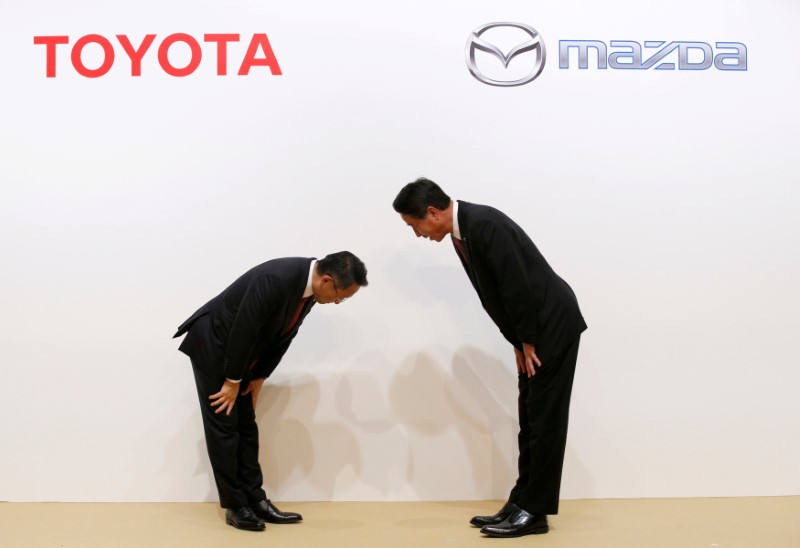By David Shepardson
WASHINGTON (Reuters) - Toyota Motor Corp (T:7203) opened the door to a bidding war among Midwestern and southern states seeking to land jobs and investment when it announced on Friday it would build a $1.6 billion U.S. assembly plant with Mazda Motor Corp (T:7261).
Toyota North America chief Jim Lentz told Reuters in an interview the automaker has not started searching for sites for the plant, expected to employ 4,000 workers, but would locate the factory near Toyota's existing supply chain.
Toyota has 10 U.S. plants in eight states in an arc that runs from West Virginia through Kentucky, Indiana, Alabama, Mississippi and Texas.
For Toyota, the investment is a push to expand U.S. vehicle-making capacity and market share and intensify its attack on the Detroit automakers' lucrative truck business.
The announcement also comes as U.S. President Donald Trump has threatened tariffs to curb auto imports and is working with Republican officials to woo investment in domestic production.
States covet auto assembly plants because they typically pay above-average wages and spin off jobs at suppliers and service companies.
Southern states have advantages including rail and highway infrastructure, proximity to major ports and business-friendly labor and regulatory environments, said Foster Finley, head of consulting firm AlixPartners operations practice.
Midwestern states such as Ohio or Michigan can counter those strengths with incentives such as tax breaks or publicly funded worker training programs.
“All of it boils down to an economic arrangement,” he said.
Michigan Governor Rick Snyder said in a statement on Friday that legislation approved last week to reduce taxes on business investment "is likely something that would make Michigan competitive over other states for this project."
The Toyota announcement came after Wisconsin last week said it will award Taiwanese manufacturer Foxconn a record $3 billion in refundable tax incentives to build a $10 billion LCD panel factory that will initially employ 3,000 people.
Still, Finley cautioned that the knock-on economic benefits of the new auto plant may be limited as much of the value of vehicles built there will likely still come from parts made in Mexico or Asia.
For a factbox on U.S. auto subsidies, see:
PRODUCTION SHIFT
Toyota has already invested $23.4 billion in its U.S. operations, and has planned another $11.6 billion in investment over the next five years, fueled by robust profits.
Trump earlier this year warned Toyota it would be subject to tariffs if it imported Corolla small cars from a factory planned in Mexico.
Lentz said he could not say what impact Trump's comments had on a decision that was under consideration for some time with Mazda because it was a decision made by executives at both car companies in Japan.
"We understand the direction that we are getting from the administration and that is to build more in the U.S.," Lentz said. "Pressure from the White House would be the wrong word."
Under its new plan, Toyota's forthcoming factory in Guanajuato, Mexico will not build Corollas that are currently assembled in Canada and instead build the medium-sized Tacoma pickup. It will continue to build Corollas in Mississipi as well.
Lentz said the shift will allow Toyota to build more pickup trucks overall by adding more Tundra production in Texas and shifting Tacoma production to Mexico.
"This is the fastest way to additional pickup truck supply," Lentz said, saying he expected to boost truck capacity by late 2019 or early 2020. That will help Toyota compete for a bigger share of the U.S. truck market, which has benefited from a shift in consumer tastes towards larger vehicles.
Toyota's U.S. Corolla sales are down nearly 9 percent this year.
ADDING CAPACITY
States will be competing to add a plant in a market that is already awash with production capacity and experiencing a slowdown in domestic auto sales.
Toyota, along with German and Asian automakers, have during the past 30 years built a second auto industry in the United States, rivaling the U.S. operations of the Detroit Three automakers in size and employment, but with newer, and far less unionized, plants.
The Detroit Three closed several U.S. factories during the 2008-2009 financial crisis. But since then U.S. automaking capacity has grown.
Volkswagen AG (DE:VOWG_p) opened the last new U.S. assembly plant in 2011 in Tennessee to build new cars after getting nearly $600 million in tax incentives. But the automaker in 2013 opted to build a plant for its luxury Audi unit in Mexico instead of in the United States.
Volvo Cars, a Swedish brand owned by China's Geely Automobile Holdings Ltd (0175.HK) [GEELY.UL] will open a $500 million U.S. assembly plant next year in South Carolina.
U.S. auto plants produced about 12 million vehicles, with capacity utilization in 2016 at 94 percent. Overall U.S. capacity is expected to grow by nearly 11 percent between 2016 and 2023, from about 12.5 million to just over 14 million, according to LMC Automotive.

U.S. auto sales have weakened so far this year, and already two U.S. factories operated by General Motors Co (N:GM) have indefinitely laid off work shifts, while others have scaled back production.